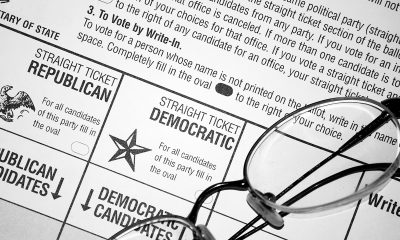Virginia
Gay GenZer wants to be youngest Va. state delegate
Zach Coltrain is running in 98th House district

Zach Coltrain lives in two worlds. In one, he traverses the serene landscapes of Appalachian State University in North Carolina’s Blue Ridge Mountains — studying the use of music as a therapeutic intervention. In the other, he navigates the thorny world of politics in the neighboring state of Virginia, which saw a conservative shift after the election of Republican Gov. Glenn Youngkin in 2021.
Coltrain, a 20-year-old gay Democrat, said those two worlds have coexisted for him since high school — where he split time between the debate team and musicals, campaigning and band practice, politics and music.
“It’s really important to me, solidifying my education with mental health, especially when I let it exist with government, where it appears most people don’t have a strong grasp on how mental health works,” he told the Washington Blade.
The balance will certainly be harder to steer as Coltrain announced his campaign for Virginia’s 98th House of Delegates district in August 2021 — becoming the youngest candidate to run for a seat in Virginia’s lower body. In fact, Coltrain, who grew up in the district, won’t meet the minimum age requirement of 21 until his birthday in September, two months before the election.
Coltrain is joining an ever-growing list of political candidates from Generation Z — defined as those born between 1997 and 2012 — whose older members are just reaching the age where they can legally run for office, 2022 being the first year Gen Z could run in federal elections. And it didn’t take long for Gen Z to get on the board.
On Saturday, Florida Congressman Maxwell Frost, 25, was officially sworn into the U.S. House of Representatives, becoming the first Gen Z congressperson in history.
“The people of Orlando sent me to Washington, D.C., to fight for them and enact the kind of change they want to see in our communities. Gun reform, universal healthcare, housing affordability, tackling the climate crisis and more,” Frost said in a statement. “We have so much work to do, but I’m honored to represent my people.”
In addition, according to campaign finance tracker Open Secrets, Gen Z candidates for federal offices raised millions of dollars during the 2022 campaign season. The nonprofit identified at least seven Gen Z candidates — four Democrats and three Republicans — vying for congressional seats in 2022.
Gen Z is also partially responsible for thwarting the so-called “red wave” that many political analysts predicted for last year’s midterms. In 2022, Democrats overperformed, gaining one seat in the Senate and not losing nearly as many seats in the House as predicted.
Ashley Aylward, a senior researcher at the Washington-based public opinion research firm HIT Strategies, wrote in Time that an “earthquake of young voters shook up the political world” in 2022.
“When young people’s rights are on the ballot and championed by the candidate, they show up,” she wrote.
The numbers seemed to back up her claims. About 1 in 8 voters overall were under 30, according to early exit polling and AP VoteCast, and more than half supported Democratic candidates in the midterm elections. It came during the same year that the U.S. Supreme Court overruled Roe v. Wade, stripping pregnant people of the Constitutional right to an abortion; 74 percent of 18-29-year-olds believe abortion should be legal in all or most cases, according to recent data from the Pew Research Center.
In an interview with the Blade, Aylward couldn’t say definitively whether we could expect a similar turnout of young voters in statewide and local races. Coltrain’s race will be decided later this year — Nov. 7, 2023 — with no headline-grabbing national or gubernatorial elections to help boost turnout.
But Aylward — speaking broadly and making clear she didn’t have enough data to make any clear conclusions — speculated that Dobbs v. Jackson, the case that gave the state’s the power to decide abortion rights, could lead to increased turnout in often overlooked statewide elections.
“I have noticed a shift in attention being turned towards state and local politics, because we know that is where the most impact happens on our day-to-day lives,” she said. “But a lot of it was sparked from the Dobbs v. Jackson case, because people now realize that these decisions about our bodies are going to be made in our state legislatures.”
Aylward added that she hopes to do more research on the topic in the future.
Furthermore, Aylward said she has found that Gen Z voters are “way more motivated to vote when they see young people like them run for office.”
“Most often of what we hear in focus groups is that young people are usually feeling more jaded, because they don’t see people like them in elections, particularly young,” she said.
This begs the question: Can a man not yet able to legally consume alcohol convince the people of Virginia’s 98th House district to vote for him?
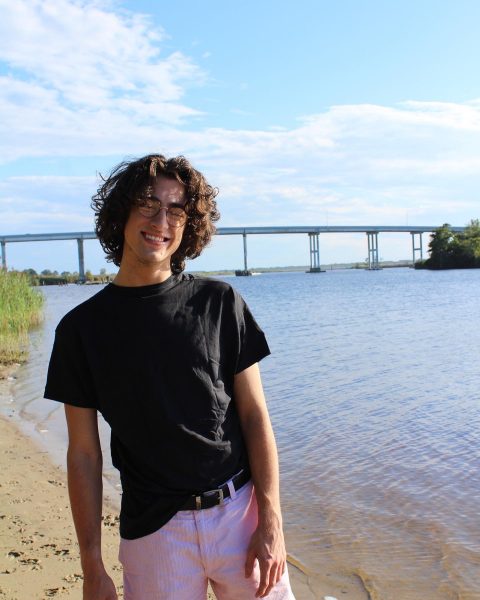
In general, Aylward said, she has found that age does matter to some folks. “But most of the time, it boils down to the issues. [Voters] go on and on about the issues that people are championing,” she said.
Coltrain is the only Democrat in the race, clearing his path to the general election. However, his journey to the Virginia House becomes murkier after the primaries. According to the Virginia Public Access Project, Coltrain’s Republican opponent will either be Glenn Davis or Barry Knight — both of whom are current Virginia delegates.
Davis has represented District 84 since 2014, and Knight has represented District 81 since 2010.
The district, which encompasses the southeast corner of the state, did change after redistricting, but it still favors Republicans. The new 98th District is made up of parts of the old 84th, 81st and 21st Districts — all of which favored former President Donald Trump in the 2016 election. In 2021, the 98th District overwhelmingly voted for Youngkin, who captured 63.06 percent of the vote. VPAP categorizes the district as “strong Republican.”
Coltrain admitted that competing in the district worried him, saying there are no guarantees that the district will be flipped. But he believes his campaign is unique and will make him tough competition for his Republican opponent.
Zeroing on Knight, Coltrain criticized the incumbent’s past challengers. “The past few candidates we put up against Barry Knight, my opponent, have been other rich white guys,” he said. “Nobody’s really eating that up.”
“I think that’s not our case, here,” Coltrain added. “I’m a student on a Pell Grant with student aid and a music scholarship, literally barely hanging on financially at points.”
Furthermore, Coltrain touted his campaign issues — which focus on environmental protection, education and healthcare — as a “reflection of both [his] district and also Gen Z in general.”
“I think I found a way to find this niche intersection, where a rural district with farmers in it have the same common interests as Gen Z advocates,” he said. “And I think a big part of that can be the environment.”
As for his opponent using his age against him, Coltrain said, “Honestly, I hope they do.”
“My age is something that I’m going to flip as a good thing, and I have been campaigning with it,” he said. “I started right off the jump telling people that I’m here, and I’m young, and I’m not even old enough to hold the office that I’m running for. I am aware that this is unique, and I’m aware that being the youngest person to run is something that will make people uncomfortable.”
But Coltrain, who has worked on campaigns since he was a teenager, thinks that the “argument that there’s not room for [young people] at the table is not true and won’t be true.”
“I know how to have a real impact in our district,” he said. “I know that specifically, when we’re looking at young activists and organizers, our district is looking for them, tirelessly. I think that this could be a wake up call for us, it can be a way for people my age and people of my generation to realize that this is something that they can do and realize this is the space that they are supposed to exist in.”
Coltrain has no lack of people who believe he could very well be the person to flip the district. In fact, Dr. William “Fergie” Reid, the founder of 90 for 90, an initiative that aims to supply a Democratic challenger in all Republican-controlled districts, reached out to Coltrain directly and encouraged him to run.
Reid — named after his father, William Reid, the first African American elected to the General Assembly in the 20th century — said he was looking for a candidate who was “in college, politically inclined and not scared.” Eventually, he said, “I got his name, and I tracked him down. When I talked to him, he couldn’t have been cooler, and [he] understood what I was talking about.”
In 2021, Republicans swept all three statewide positions — governor, Youngkin, lieutenant governor, Winsome Sears, and attorney general, Jason Miyares — and took control of the House of Delegates in an upset. Youngkin became the first Republican to win a statewide election in Virginia in more than a decade.
Reid said Democrats’ losses in the state were narrow in 2021 and came down to Democrats “not playing hard enough.” To Reid, “if Democrats just play a little bit harder, they’ll take back the majority. And this is what Zach is doing; he’s helping Democrats play just a little bit harder.”
Youngkin has since signed an executive order to root out critical race theory in Virginia’s education system. He has also supported anti-LGBTQ policies, including forcing teachers to out queer students and restricting the rights of transgender students.

Coltrain, who came out as gay when he was 11 years old, said he “was comfortable in telling everybody that I was gay from a really early age.” But “looking at the way things are now, I don’t know that even right now, people could still have that story in the area that I grew up in. And it’s been super, super scary.”
“He’s got the right stuff, and I couldn’t be more proud of him,” he said of Coltrain.
Coltrain is staring down a busy semester, one sure to be full of aching feet and headaches as he’s committed to his campaign, coursework, part-time food truck job and Application State’s debate team, where he is one of two captains.
“It’s a lot for sure,” he said with uncertainty in his voice. “We’re trying to balance it.”
But the brief moment was drowned out by his overwhelming enthusiasm.
“Schoolwork all day and campaigning all afternoon is just normal now,” he said, calling the opportunity “life changing.”
Virginia
Defying trends, new LGBTQ center opens in rural Winchester, Va.
‘It has taught me that I am not alone in this place’
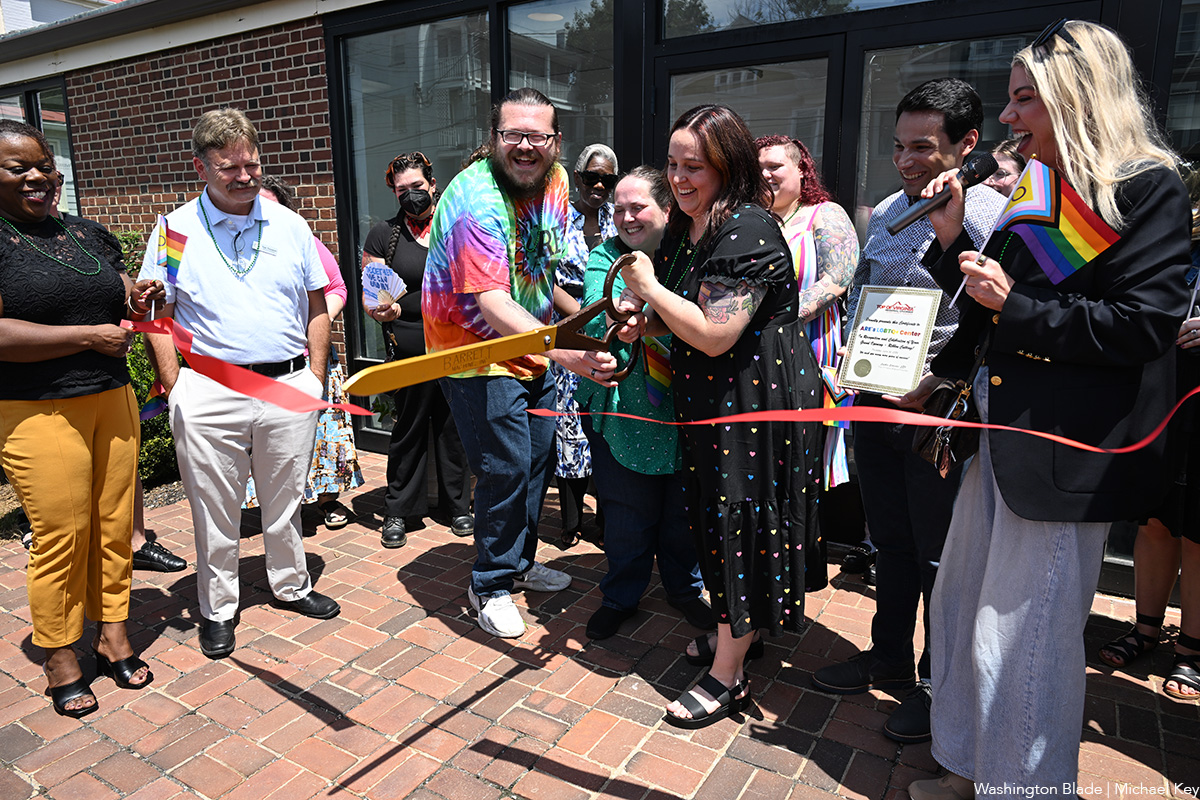
A new LGBTQ community center celebrated its grand opening on June 30 in Winchester, Va., defying recent trends amid a federal crackdown on DEI and LGBTQ funding.
The local HIV/AIDS service organization AIDS Response Effort, Inc. (ARE) worked with a team of volunteers to open the area’s first physical center.
ARE’s R.I.S.E. (Resources, Inclusion, Support and Empowerment) Center, located near the heart of Old Town Winchester on West Piccadilly Street, is more than a renovated bank building to the local LGBTQ community. The empty teller window on the side of the structure and converted vault inside give away the building’s past. But the volunteers, program participants, and well-wishers gathered at the ribbon-cutting ceremony tell the Blade that they are hopeful for a thriving future for the building — and the community.
The Washington Blade spoke with the executive director of ARE as well as the co-directors of ARE’s R.I.S.E. Center during a tour of the facility ahead of the opening.
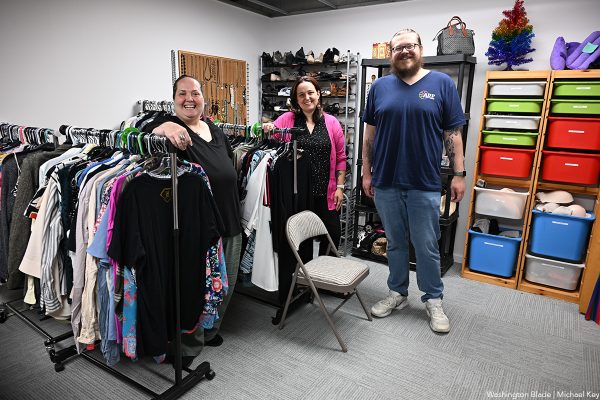
Katy Vance, executive director of ARE told the Blade, “I started [at ARE] about five years ago and we were an AIDS service organization, we have been for about 35 years now. We started as a group of volunteers out at the hospital —with Valley Health, and we’ve grown into a program that provides HIV case management for folks living with HIV in the community.”
Vance explained that as community needs have changed for service organizations like ARE, it has led to some soul-searching among advocates.
“We had this big meeting about, ‘who are we?,’ ‘who do we want to be?,’ ‘who do we want to be in a few years?,’” Vance recalls. “As things shift and change with HIV … we have a lot of folks that come into our office who are newly diagnosed. They will get connected to a medical case manager, they’ll get on medication, and they are undetectable within one to two months, which means they are untransmittable, which is amazing.”
“So, science and technology has come so far,” Vance continued. “And so, who are we when this tends to go in the direction of no longer being the major epidemic it has been for the last 40 years, right?”
“But, when I came in, we also had a general housing program for anyone in the community,” Vance said. “That was confusing for a lot of people who came into our doors trying to figure out who we were and what we are. We called it, our ‘identity crisis,’ essentially.”
“Are we an HIV service organization? Are we a housing program?” Vance asked. “So we worked with our local Goodwill and the board got together and we decided to transition our housing program out and we realized we wanted to open an LGBTQ center.”
“We have had a little bit of pushback as to why an HIV agency is opening a center,” ARE’s R.I.S.E. Center Co-Director Matt Buracker said. “Obviously, HIV and LGBT identities have a long history and a lot of stigma, but we felt like it was kind of irresponsible to talk about one without talking about the other. And we’ve always been supporting the LGBT community, so we’re just expanding our services to encompass more.”
The center seeks to serve the LGBTQ community in a county that Donald Trump carried with more than 63% of the vote in the 2024 election. While ARE receives state and federal grants for its operations, the LGBTQ center is currently funded by community donations and a founders’ campaign and is staffed with volunteers.
Vance tells the Blade that the Center met its initial fundraising goal of $50,000 very quickly. The building housing the center was renovated with a combination of grants, donations and volunteer work.

“I think our fundraising goals now are going to be more programmatic so that we can do the things that we want to do,” R.I.S.E. Center Co-Director Mary Bohacek said. “Because Matt and I are great at finding things to do for free. But there are other things that people are asking us to do, craft events or things that aren’t free to do. Eventually, we might need a license if we want to do movie screenings. So there is always going to be a fundraising need to fund the programming, but the building has been a huge success.”
“The support from the community has been overwhelming,” Buracker told the Blade. “We’ve had such a positive response from the community and it’s just it’s been so emotional to see that the need has been here and we are the one to finally do something about it.”
Vance interjected, “And of course, there are community members that aren’t a fan that are ‘keyboard warriors’ that are coming out saying stuff. What is amazing is: we had an article in the paper and they put it up on their Facebook page and people were making just terrible comments. But then, we got new volunteers from that. The community support has been, like Matt said, amazing and overwhelming.”
ARE’s R.I.S.E. Center is a member of CenterLink, a community of LGBTQ centers. Other LGBTQ community centers in the wider region include the Roanoke Diversity Center in Roanoke, Va, the Shenandoah LGBTQ Center in Staunton, Va., Diversity Richmond in Richmond, Va., NOVA Prism Center in McLean, Va., the DC Center for the LGBT Community in Washington, D.C. and the Frederick Center in Frederick, Md. A new MoCo Pride Center is scheduled to open in Bethesda, Md. in August.
While the physical building opened to the public on June 30, the R.I.S.E. Center in Winchester has held events for more than a year.
“We’ve had programming going on for almost two years now,” Bohacek told the Blade. “Our first event was a ‘Friendsgiving.’ There were so many people that showed up that we literally didn’t have enough space: we needed to knock down walls.”
The staff and volunteers at ARE and the nascent Center used that momentum to foster the growth of affinity groups, community groups and services.
Affinity groups are described as “not just support groups or social groups, but rather as something of a hybrid between the two.” As Bohacek says about the affinity groups, “if someone needs community or needs a place to talk about queer issues, they have a space to do that.”
Affinity groups hosted by the Center include a group for trans and gender non-conforming people, a group for the families of trans people, a polyamorous affinity group, an aro-ace group, a “Rainbow Connection” all-purpose group, and a “Gay-RP” affinity group for people 50 and older.
“We also have a young adult group, which is for ages 18-25, which is one of the more vulnerable sections of our community,” Bohacek said. “So we want to make sure that they have places to connect.”
As reported in the Blade, the youth advocacy organizations Hopelab and Born this Way Foundation recently issued a report that suggests LGBTQ youth (ages 15 to 24) living in rural communities face greater challenges than their suburban or urban peers in dealing with their sexual orientation or gender identity, though have significantly benefited from online resources.
“We also have some community-wide programming that allies are welcome attend,” Bohecek said. Programming includes a monthly game night, a volunteer night for the many Center volunteers, as well as the “stitch and bitch” group, who “sit, crochet, embroider and talk.”
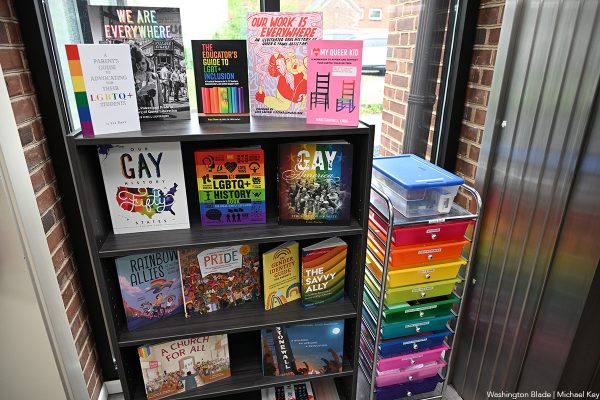
“And Coffee and Coloring!” Bohecek exclaims. “That’s one of my favorites. We like to say it’s about — just sit down, relax, have a cup of coffee — but frankly it’s about community building.”
Bohacek proudly lists the many other services the center offers, including a transgender/gender-affirming closet, which is currently overflowing with donations of clothes.
“We also have an amazing library of all kinds of identities and all kinds of ages for people to come and see,” Bohacek told the Blade. “This building is actually an old bank, so we put our books into the vault.”
The old bank, now vibrant community center, was filled to capacity for the official opening ceremony on a hot Monday afternoon in late June. People from across the Shenandoah Valley who had come to the ribbon-cutting event snacked on rainbow-colored cupcakes as they toured the renovated building.
“To be a gay man growing up in a small, rural area . . . we didn’t have anything like this,” Front Royal, Va. resident Ed McKee told the Blade. Though he lives in a town a few miles away, he works at a salon in Winchester and had come to see the new center opening.
“We didn’t have anything like this when I was growing up,” McKee said as he gestured toward the packed LGBTQ community center. “If we had, it would have made my life so much easier. I probably would have come out sooner — I didn’t come out until I was about 30 — because I would have felt the support, you know?”
“Especially now with everything that is going on in our country,” McKee continued. “We need to show strength in numbers: come together. And the center is allowing for that to happen.”
McKee’s husband, Winchester business owner Paul Miller, agreed.
“I’m hoping that [the Center] can be a great way to connect with people who might not otherwise understand how they can come together,” Miller told the Blade. “And I’m hoping that, while I’m not sure that this is its mission, I’m hoping that it has a political effect in Virginia.”
Members of the community who came to witness the opening gathered outside of ARE’s R.I.S.E. center for the ribbon cutting. Speakers at the ceremony included the Center’s co-director Bohacek.
“Today, we’re celebrating the renovation of the building,” Bohacek began. “But, we’re also celebrating the rise of this community.”
“This community has taught me resilience and it has taught me friendship and it has taught me that I am not alone in this place,” Bohacek told the crowd. “There are people that care. And we are so proud to have a place where we can be ourselves, where anyone and everyone is welcome — and we mean it. So, with that said, let’s keep on rising!”
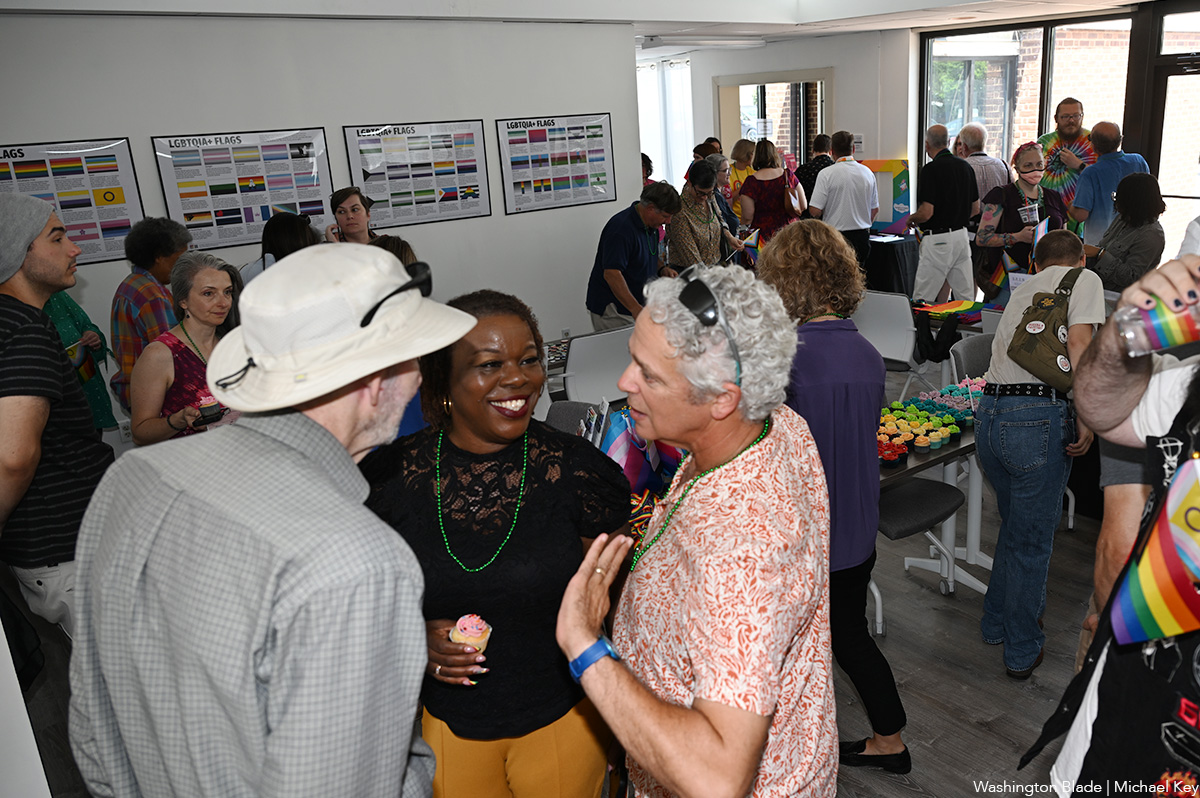
Virginia
Va. court allows conversion therapy despite law banning it
Judge in June 30 ruling cited religious freedom.

In 2020, the state of Virginia had banned the practice of conversion therapy, but on Monday, a county judge ruled the ban violates the Virginia Constitution and Religious Freedom Restoration Act, allowing the therapy to start once more.
The conversion therapy ban, which can be seen in Va. Code § 54.1-2409.5 and 18VAC115-20-130.14, was overturned on June 30 as a result of two Christian counselors who argued that their — and all Virginia parents’ — constitutional right to freedom of religion had been encroached upon when the state legislature passed the ban.
A Henrico County Circuit Court judge sided with John and Janet Raymond, two Christian counselors represented by the Founding Freedoms Law Center, a conservative organization founded in 2020 following Virginia’s conversion therapy ban. Virginia’s Office of the Attorney General entered a consent decree with FFLC, saying state officials will not discipline counselors who engage in talk conversion therapy.
Conversion therapy, as the legislation described it, is considered to be “any practice or treatment that seeks to change an individual’s sexual orientation or gender identity, including efforts to change behaviors or gender expressions or to eliminate or reduce sexual or romantic attractions or feelings toward individuals of the same gender.” The ban’s reversal will now allow parents to subject their children to these practices to make them align better with their religion.
This decision comes despite advice and concern from many medical and pediatric organizations — including the American Psychiatric Association, American Psychological Association, American Association for Marriage and Family Therapy, and the American Counseling Association, to name a few — all of which denounce conversion therapy as dangerous and harmful to those subjected to it.
The American Medical Association, the largest and only national association that convenes more than 190 state and specialty medical societies, says that “these techniques are the assumption that any non-heterosexual, non-cisgender identities are mental disorders, and that sexual orientation and gender identity can and should be changed. This assumption is not based on medical and scientific evidence,” with attached data indicating people subjected to conversion therapy are more likely to develop “significant long-term harm” as a result of the therapy.
The AMA goes as far as to say that they outright “oppose the use of reparative or conversion therapy for sexual orientation or gender identity.”
FFLC has a clear goal of promoting — if not requiring — conservative ideology under the guise of religious freedom in the Virginia General Assembly. On their website, the FFLC argues that some progressive policies passed by the Assembly, like that of freedom from conversion therapy, are a violation of some Virginians’ “God-given foundational freedoms.”
The FFLC has argued that when conservative notions are not abided by in state law — especially when it involves “God’s design for male and female, the nuclear family, and parental rights” — that the law violates Virginians’ religious freedom.
A statement on the FFLC’s website calls gender dysphoria among children a “contagion” and upholds “faith-based insights” from counselors as equal — in the eyes of the law — to those who use medical-based insights. This, once again, is despite overwhelming medical evidence that indicates conversion therapy is harmful.
One study showed that 77 percent of those who received “sexual orientation change efforts,” or conversion therapy, experienced “significant harm.” This harm includes depression, anxiety, lowered self-esteem, and internalized homophobia. In addition, the study found that young LGBTQ adults with high levels of parental or caregiver rejection are “8.4 times more likely to report having attempted suicide,” with another study finding that “nearly 30 percent of individuals who underwent SOCE reported suicidal attempts.”
Virginia Senate Majority Leader Scott Surovell, a Democrat representing Fairfax, said that the overturning of the ban on religious merit disregards the entire concept of having professionally licensed counselors.
“I have no problem if somebody wants to go look at religious counseling from their priest or their minister, their rabbi, their imam — that’s perfectly fine,” Surovell told the Virginia Mercury. “When somebody goes to get therapy from somebody licensed by the commonwealth of Virginia, there’s a different set of rules applied. You can’t just say whatever you want because you have a license. That’s why we have professional standards, that’s why we have statutes.”
Virginia
Walkinshaw wins Democratic primary in Va. 11th Congressional District
Special election winner will succeed Gerry Connolly

On Saturday, Fairfax County Supervisor James Walkinshaw won the Democratic primary for the special election that will determine who will represent Virginia’s 11th Congressional District.
The special election is being held following the death of the late Congressman Gerry Connolly, who represented the district from 2008 until 2024, when he announced his retirement, and subsequently passed away from cancer in May.
Walkinshaw is not unknown to Virginia’s 11th District — he has served on the Fairfax County Board of Supervisors since 2020 and had served as Connolly’s chief of staff from 2009 to 2019. Before he passed away, Connolly had endorsed Walkinshaw to take his place, claiming that choosing Walkinshaw to be his chief of staff was “one of the best decisions I ever made.”
The Democratic nominee has run his campaign on mitigating Trump’s “dangerous” agenda of dismantling the federal bureaucracy, which in the district is a major issue as many of the district’s residents are federal employees and contractors.
“I’m honored and humbled to have earned the Democratic nomination for the district I’ve spent my career serving,” Walkinshaw said on X. “This victory was powered by neighbors, volunteers, and supporters who believe in protecting our democracy, defending our freedoms, and delivering for working families.”
In addition to protecting federal workers, Walkinshaw has a long list of progressive priorities — some of which include creating affordable housing, reducing gun violence, expanding immigrant protections, and “advancing equality for all” by adding sexual orientation and gender identity to the Fair Housing Act.
Various democratic PACs contributed more than $2 million to Walkinshaw’s ad campaigns, much of which touted his connection to Connolly.
Walkinshaw will face Republican Stewart Whitson in the special election in September, where he is the likely favorite to win.
-

 Federal Government2 days ago
Federal Government2 days agoTreasury Department has a gay secretary but LGBTQ staff are under siege
-

 Virginia3 days ago
Virginia3 days agoDefying trends, new LGBTQ center opens in rural Winchester, Va.
-

 District of Columbia2 days ago
District of Columbia2 days agoGay GOP group hosts Ernst, 3 House members — all of whom oppose Equality Act
-

 Opinions4 days ago
Opinions4 days agoUSAID’s demise: America’s global betrayal of trust with LGBTQ people

